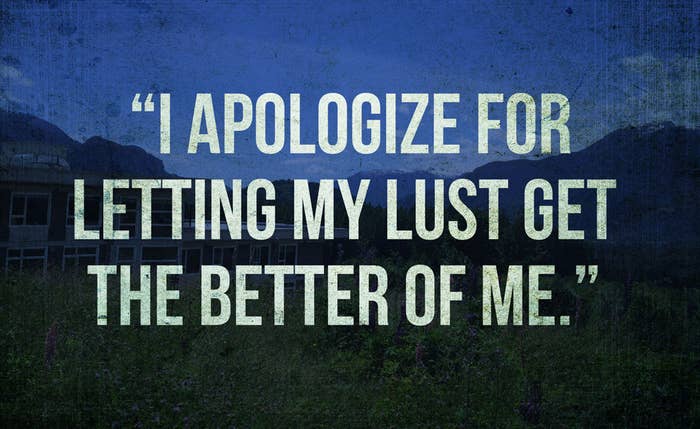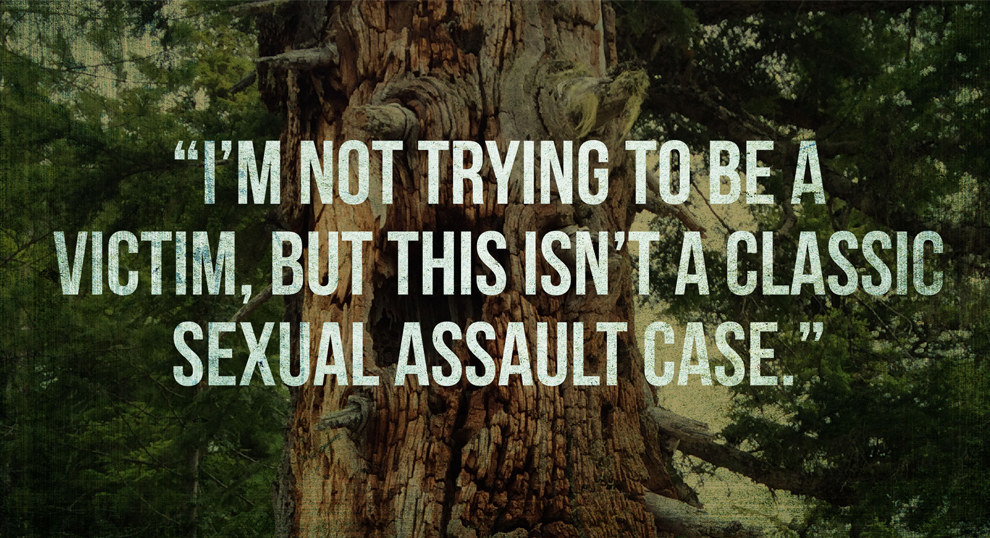
SQUAMISH, British Columbia — North America isn't short on tiny, remote liberal arts colleges, but even by those standards Quest University is remarkably tiny, remote, and liberal. Located on an idyllic mountain range in British Columbia and operating under the motto "Question everything," Canada's first and only private, secular nonprofit university is a promising experiment in higher education: A 2013 national survey ranked Quest, which is only seven years old, the best university in Canada.
Quest certainly looks like collegiate paradise: The 60-acre campus in Squamish, a tiny town off the spindly Sea to Sky Highway between Vancouver and Whistler, overlooks looming granite peaks, lush forests, and sparkly turquoise fjords. Students access the panoramic library via a glass elevator that rises over a native fern garden. After class, they build tree houses above babbling brooks and wildflowers.
But Quest became the center of a less utopian experiment last spring when it faced a flood of sexual harassment allegations, many against the same male student. After three freshman women filed formal complaints alleging assault, the school hired external investigators who cited speculation about the complainants' sexual history and drinking habits before declaring the claims were false. When the outraged women tried to support one another, Quest warned them that they risked violating the school's confidentiality code by discussing the complaint process. Privacy is critical when there are only 550 students on campus. But without a forum to openly discuss what happened, overblown rumors about the accused spread through the tiny community. And these rumors were taken much more seriously than the ones used to discredit the accusers.
Quest's quandary is universal; schools across the continent are grappling with sexual assault allegations. But there are no deep-rooted institutional issues impeding Quest's radical goals of remaking higher education or nurturing a respectful community: no tenure, no departments, no Greek life, and no influential alumni (no alumni older than 30, actually, since the first graduating class matriculated in 2011). The school is explicitly not for everyone; Quest can ask students to leave if they fail to contribute to the intellectual environment, and has done so in the past. Part of what students pay for, along with $29K annual tuition plus $9,500 mandatory room and board, is the assumption that Quest is a bubble, safe from more than just tedious courses and fluorescent-lit lecture halls.
There's no rule book for mediating the line between assault and harassment, or even between an assailant and an asshole. But there's a spectrum of coercive sexual behavior, often referred to as "rape culture," that falls short of meeting the legal definition of rape in court — and nearly all liberal arts schools have policies in place that promise to address them. Quest advertises itself as the sort of place that's unafraid to thoughtfully tackle these tough questions. But when faced with murky disputes over consent, the school did what its counterparts in the United States have for decades: It held ineffectual campus forums, hid behind legal definitions of assault, and left both the accuser and the accused feeling unsafe.

During the week BuzzFeed spent on and around campus, the complainants said they felt dismissed and disbelieved by an administration eager to protect itself from liability, which could jeopardize the fledgling school's precarious finances. The school president said the allegations were unfounded and that "rampant misinformation" would make it harder for real sexual assault survivors to seek recourse.
U.S. schools must comply with Title IX, a federal gender equity law that protects students from sexual harassment and assault. Since rape convictions are tough to prosecute, the law instructs schools to judge cases and discipline perpetrators by the relatively broad "preponderance of evidence" standard used in civil cases — essentially, whether it's more likely something happened than it didn't. Canada has no such law, and Quest recommends students report sexual assault to the police. But its sexual harassment policy prohibits "conduct, including a communication, of a sexual nature," as long as the aggressor "knows or ought reasonably to know that the conduct would be unwanted or unwelcome to a reasonable person."
An articulate and confident 18-year-old who we'll call Stephanie — Quest students spoke at length to BuzzFeed on the condition their names not be used — thought she had an open-and-shut case against her alleged assailant.
One night in November, feeling depressed after her boyfriend left town for a long trip, Stephanie texted a close friend and classmate, Tyler, who invited her over and into his room for some Scotch. Stephanie knew Tyler, an older student from an established Vancouver family, had a crush on her, she said. He wasn't shy about his feelings, and she didn't mind the attention, but she made it clear that she just wanted to be Tyler's friend.
The two drank and talked; eventually, Stephanie said, Tyler pressured her into lying down next to him on his bed. "You chose the wrong guy," he said, referring to her boyfriend. "He can't make you happy." Stephanie told him that wasn't true. But still, Stephanie said, Tyler grabbed her, groped her vagina and chest so hard he left bruises on her nipples, and attempted to push her onto her back. When she resisted, Tyler said he'd stop, but continued to kiss and touch her. Finally, Stephanie said, she pushed him off and ran to her room.
Tyler, clearly distraught, texted her afterwards and throughout the week to apologize. "Fuck…do you need me to say it…you do something to me," said one. "I apologize for letting my lust get the better of me," said another. "I'll control myself…just slap me sometimes."
Instead of responding, Stephanie called the police. "I was terrified he'd finish what he started," she said. The police hauled Tyler in and gave him a no-contact order, but eventually decided there wasn't enough evidence to press charges. By February, Stephanie was still having panic attacks whenever she saw Tyler on campus and had trouble keeping up with her coursework, she said. She decided to file a formal complaint with Melanie Koenderman, Quest's dean of students — a decision she had discussed with Koenderman shortly after her alleged assault in November.
"I believe Quest is a place where every student has the right to a healthy, safe learning experience and community," Stephanie wrote in her complaint, obtained by BuzzFeed. "I hope you will help take the action necessary to restore this sense of safety for me."
After she filed her complaint, Stephanie drove to Vancouver to meet with Dr. Deborah Connolly, an associate professor of psychology at Simon Fraser University who Quest hired to investigate. Connolly interviewed Stephanie and Tyler and analyzed their testimonies and other submitted evidence before concluding that Tyler hadn't violated the school's Human Rights Policy.
While Connolly conceded that Tyler "did not ask for permission, each step of the way" she did not believe that his unasked-for sexual touching had been "unwanted." Furthermore, Connolly wrote, Stephanie had described herself in a "positive" way, as someone who was in a monogamous relationship and didn't often talk about sex, while Tyler's testimony depicted "a different person." For example, Tyler told Connolly that he and Stephanie often discussed her sexual experiences and preferences, including some "pretty disturbing things," like dating older men. "This biased self-presentation did not destroy [Stephanie's] credibility, but it diminished it somewhat," Connolly wrote.
Koenderman accepted Connolly's conclusions. "Based on her finding that no violation of the Human Rights Policy has occurred, Quest will not take any further action or impose any sanctions in connection with your complaint," she wrote to Stephanie in mid-April, adding that Quest could assist Stephanie if she wanted to switch out of classes or housing assignments, offer her counseling, and keep her no-contact stipulation against Tyler.
Stephanie was shocked that the investigator agreed she didn't consent but used Tyler's version of her sexual history to discredit her claims. She was also hurt. Stephanie trusted and liked Koenderman — the two were so close that Koenderman later helped her land a summer job at a local food truck. The police couldn't bring charges, but "at least they didn't call me a slutty liar," she said. She read the final report with her boyfriend, and the two of them cried.
"I really thought we would get him," Stephanie said. "I thought the truth would be enough. But what it came down to is that she liked Tyler's story better."

Quest President David Helfand, an astrophysicist on extended leave from Columbia University, defended the school's decision to hire professional investigators; they're expensive but necessary, he said, since it would otherwise be too difficult to conduct an unbiased investigation in such a small community. In general, he said, Quest approaches sensitive issues differently than schools under fire in the U.S., which have "a lot of historical baggage and lack our cohesive community."
What Stephanie did next damaged that notion of a "cohesive community." She, two other outraged complainants, and several supporters determined that Quest had backed out of its professed obligation to protect the student body. If the school wouldn't take action, they'd break the school's "confidentiality code" — Quest's Human Rights policy warns complainants not to disclose the details of their complaints — and spread the word themselves.
Shortly before Stephanie's complaint was rejected, she connected with another first-year student, Carrie, via an anonymous Facebook page called "MissJustice At Quest" that posts articles and information on rape culture. Stephanie and Carrie, a studious freshman passionate about social justice, had never spoken before, but they quickly opened up to each other about what they considered Quest's "sexual assault problem." Carrie filed a formal complaint in March against a freshman named Jaden, claiming that he had pressured her into sexual activity that she didn't consent to while the two were hanging out alone in his room, even though she had told him repeatedly she didn't want to sleep with him or touch him.
The two women started asking their friends and classmates whether they had ever felt unsafe on campus too. Within a few days, Stephanie said, she spoke to two other students who said Tyler had made sexual advances they didn't feel comfortable with; one story was eerily similar to Stephanie's. Carrie compiled a list of around a dozen women who had "shady" experiences with Jaden, a loudmouthed charmer whose Instagram is filled with photos of himself doing various outdoor activities — night skiing, hiking, hitting golf balls off a campus building roof — mostly shirtless.
Soon, they launched a support group, where they met Sasha, another first-year who had recently filed a formal complaint against Jaden. Sasha said that Jaden, sober, had steered her into a hallway during a party and groped her while she was too drunk to get away from him. Although Sasha didn't know Carrie, she had recently decided to file a formal complaint because she, too, had heard rumors about Jaden.
"He was getting away with all this stuff, so I wanted to do something about it," Sasha said. "Not just for myself, but for everyone."
The same lawyer from Victoria, Deborah Lovett, reviewed and rejected both Carrie's and Sasha's complaints on Quest's behalf by the end of April. Jaden denied that the incident with Sasha ever happened; in fact, he said, he had tried to get her home safely from the party. Lovett interviewed only one of the witnesses on the list Sasha submitted, but she quoted multiple students who said Jaden had a reputation for "wanting what is best for people and helping them out," while Sasha, "very drunk and obnoxiously so," according to witnesses, lay on a bed with another guy, with her "short skirt rolled up to her panties."
Lovett concluded that Carrie had consented at the time, even though Carrie said she repeatedly told Jaden she didn't want to touch him or be touched; she found Jaden's retelling, in which Carrie seemed "pretty turned on" and she gave him a hug "gratuitously," more credible. Lovett added an unrequested side note in both reports, obtained by BuzzFeed:
"I learned that allegations of sexual assault of several female students by a Quest student who does not drink and is identifiable as [Jaden] are being spread via social media (e.g. Facebook) amongst the Quest student population. My understanding is that terms such as 'sexual predator' are being used to describe this student … this is very concerning… publication of these unproven and unsubstantiated conversations through social media is inappropriate, irresponsible and potentially very damaging."
This type of behavior "would itself constitute the basis for a complaint under Quest's Honour Principle and Human Rights Policy," she wrote.

The lawyer's concern, unprofessional or otherwise, was spot-on. "Since all students live on campus at Quest," reads a pamphlet for prospective applicants, "the academic community is constantly abuzz with ideas and discussions that have carried over from the classrooms to the residences." Last spring, the community was "constantly abuzz" with lurid rumors of sexual assault and harassment, even before the complaints were investigated. Campus activists rallied around Stephanie, Sasha, and Carrie, creating "enthusiastic consent" poster campaigns and warning others to beware of Tyler and Jaden. Parents wrote angry emails to the administration. Quest tutors (school-speak for professors) showed up at the student-held support meetings and offered solidarity behind closed doors (no tutors would comment on the record for this story).
Students' rage blurred the lines around what constitutes a "survivor" and translated into the stuff of conservative columnists' nightmares about oversensitive millennials. Not all of the students who were dubbed (or dubbed themselves) "survivors" were recovering from assault; some just wanted to support their friends and call Jaden out for, as one student put it, "being gross."
For example, one woman who submitted a letter in support of Sasha's complaint alleged Jaden suggested she come back to his room one night, grabbing her arm and "pulling slightly." When she declined, he gripped her arm harder — until a friend said, "Let her go," and Jaden did.
The number of "survivors" vacillated; some said twelve students had been assaulted, others said seven. This was partially because not all women on the list wanted to be called survivors. Another woman who informally spoke to Koenderman described an incident in which Jaden flirted with her and leaned in to kiss her, but did not force her to kiss him back. "I didn't file a complaint because I don't really count it as assault," she said, "but I wanted to support Sasha so she didn't have to go by herself."
Dayna, another so-called "survivor," was added to the list because she had told friends about an interaction she had with Jaden in the beginning of the school year. Jaden had tried to kiss her a few times, but backed off after she consistently protested. She told other students that Jaden had told her they could "only be friends if they hooked up." But she told BuzzFeed she preferred to think of what happened as a "misunderstanding." Yet, friends told her she was a "bad feminist" if she didn't rally against him and were aghast that she still wanted to be his friend.
"I never asked to be counted," Dayna said.
Is it a school's responsibility to prevent students from drunken groping? What about aggressive arm-grabbing? Although Quest teaches students to question the status quo, administrators chose to reiterate their objective commitment to combatting sexual assault instead of conducting a larger conversation about coercion. Since the women's complaints were officially deemed false, they weren't grounds for discussion — not even by the complainants themselves.
Quest first tried to control the rising issue by holding community meetings and responding to concerned parents. But as rumors spread, the school cracked down on accusers. Koenderman sent emails to the complainants reminding them that, under the Human Rights Policy's confidentiality code, they were not allowed to "divulge any details of the complaint including the identity of the other parties." President Helfand warned a school newspaper reporter who was investigating the issue to be wary of publishing libel, and called an outspoken student named Brendan into his office for posting incendiary comments on a private Facebook page for Quest students under a discussion about a Feministing blog post called "Don't Be Friends With Rapists."
"I'm tired of seeing Quest act as a safe space for serial rapists," Brendan wrote. "We need to get these rapists out of our community ourselves or they are going to keep raping our friends."
Brendan said he thought Helfand wanted to meet with him to discuss ways to more effectively address sexual assault on campus. Instead, Brendan said, Helfand angrily told him the school interpreted his comment as a threat against the alleged perpetrators, and said Quest could report him to the police for "inciting violence" unless he removed the post.
Sure, Brendan acknowledged, no one had been accused of rape, much less serial rape. But he didn't understand why, in his view, the school was more interested in protecting alleged assailants from rumors than it was in protecting survivors in question.
"We're not going to see results from the police or the school because there's no physical evidence of consent," he said. "So what are we going to do? It's entirely on us to figure out a solution."

Quest attracts students who want to figure out solutions to pervasive problems, whether cultural or academic. The school was founded by former University of British Columbia President David Strangway as a radical reimagining of higher education. President David Helfand, who looks like Albus Dumbledore in Birkenstocks, is an esteemed reformer; at Columbia, Helfand rejected tenure on the basis that it "protects faculty members more concerned about their job security than in defending their convictions."
Quest is designed "not for 19th-century models, but for 21st-century needs," Helfand said. Instead of majors, Quest students invent "Questions" like "How do we keep imagination alive?" and "What is paradise?" Young and relentlessly energetic "tutors" teach courses scheduled on a block plan, where students take one course at a time for three and a half weeks. One popular class is Winter Hazards, where students sleep in snow caves and learn how to defend themselves from avalanches; in Mathematical Problem-Solving, students are assigned Rubik's Cubes and introduced to game theory via the previous week's Jeopardy episode.
Expectations are high at Quest because the administration implies that it offers more than just legal compliance. The school aims to "proactively create and foster an atmosphere in which sexual assault, harassment, or any demeaning words or actions towards any other person are unthinkable," Dean Koenderman said in a fall interview with the student newspaper about the school's sexual assault policy.
Instead, the angry students felt, the school was more interested in squashing rumors that could lead to lawsuits — and the women were outraged that rumors about their sexual history and drinking habits undermined their credibility, but rumors about these men's past actions were dismissed as hearsay.
"It was very obvious that the process was designed to make sure that Quest would not be liable," said Marcia, Carrie's mother. "Melanie [Koenderman] covered all her bases, but there was no feeling of care and concern."
It's definitely in Quest's best financial interests to hire external investigators who reject sexual harassment complaints, said Clea Parfitt, a Vancouver-based human rights attorney and member of the West Coast Canadian Women's Legal Education and Action Fund. She and other Canadian civil rights experts said the school's confidentiality policy was legal but "troubling" because it "prevents people from engaging in appropriate social warning."
"It's inappropriate for a school to go above and beyond to warn students not to talk about what happened to them," Parfitt said. "These women feel like they've had a bad experience. Maybe you agree or don't agree, but if you tell them they can't talk about it, that's a form of discrimination."
But Quest also felt a responsibility to protect the accused men, especially after they were formally exonerated.
"It is a difficult juggling act to ensure that students feel safe, that all parties are heard, that responses are informed, that campus discourse is productive, that protocols are followed, and that our response is timely," Koenderman wrote in an email to concerned parents obtained by BuzzFeed. "For us to impose sanctions of any kind on a student, and especially any sanction that would limit their access to education, we must — both legally and ethically — ensure that due process is followed, and that any allegations are substantiated either through the police and courts."
In an interview with BuzzFeed, Jaden emphatically denied the allegations against him — the complainants are lying, he said — and said this year had been the hardest of his life. (He declined to discuss the allegations in detail.) "It was a really traumatic experience to go through as an innocent person," he said. "I'm not trying to be a victim, but this isn't a classic sexual assault case."
Jaden said he's in voluntary therapy with a Quest counselor who is helping him as he struggles to understand why this happened. However, he said, the school has "absolutely not" disciplined him in the slightest, and the experience has not caused him to rethink the way he treats women in sexual situations, although he now plans to "choose who to help more carefully."
"I'm a friendly person, I have a strong presence on campus, and I'm known for helping people out," he said. "It makes no sense."
On the day after the two complaints against him were dropped, Jaden posted that he was "feeling grateful" on Facebook. "Justice is the best birthday present I could have asked for," he wrote.

Quest students are used to transparency from the administration, particularly from Helfand, who refused an executive-sized office so students would feel more comfortable walking through his door, and is open about the startup school's financial instability, leading some students to wonder whether their degree will mean anything a decade from now. But Helfand, who is under contract with a publisher to write a book called A Survival Guide to the Misinformation Age, said the way last spring's controversy unfolded was antithetical to Quest's philosophy, which centers on "making decisions based on evidence."
Helfand said the school educates students on consent during orientation (although multiple students said the "workshop" consisted of a brief PowerPoint on Canadian laws) and recently hired a visiting faculty member to consult on related training and education. He reiterated that Quest allows students to switch classes and residence rooms even if complaints are unsubstantiated.
"It's simply not true" that Quest students don't feel listened to, he said.
But the students whose claims were proven false say there's no more evidence they could've provided. Worst of all, they said, was that the school treated them like liars. The police couldn't press charges when Carrie and Sasha called them, but at least they were sympathetic.
"If I was going to make something up, I would have made it worse," Carrie said.
A woman is sexually assaulted by forced intercourse every 17 minutes in Canada, according to the Justice Institute of British Columbia. The White House says that 1 in 5 college women are sexually assaulted during their time on campus.
If Stephanie, Sasha, and Carrie aren't included in those statistics, does that mean their experiences are meaningless — and that they shouldn't be allowed to discuss them? Students all over the continent reject that premise, whether via guerrilla "rapist lists" or hashtags like #yesallwomen, in which users tell stories of sexual violence both explicit and insidious.
The idea that "one's experience should be validated independent of what the experience actually was" is deeply out of sync with Quest's philosophy, Helfand said.
But to Carrie's mother, legal jargon is a way around plain facts.
"So what if it's not legal sexual assault," she said. "Where do you draw the line? Would David Helfand act that way? Quest is supposed to be an intellectual environment. What are the basic standards?"
